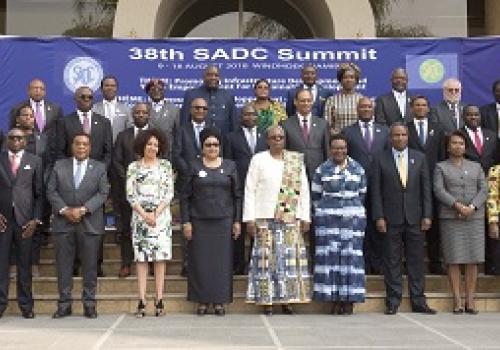The Minister of International Cooperation and Relations of the Republic of South Africa, Hon Dr. Lindiwe Sisulu, Minister of International Relations and Cooperation and Outgoing Chairperson of the SADC Council of Ministers on 13 August 2018 handed over the Chairpersonship of the SADC Council of Ministers to Hon Netumbo Nandi-Ndaitwah, the Deputy Prime Minister and Minister of International Cooperation and Relations of the Republic of Namibia.
The handover took place at the opening of the meeting of the SADC Council of Ministers, ahead of the 38th SADC Summit of Heads of State and Government to take place on 17-18, August 2018 at Safari Conference Centre, Windhoek, Namibia.
In her remarks, the Outgoing Council Chairperson, Hon Dr Sisulu congratulated Hon. Nandi-Ndaitwah for assuming the Chairpersonship and pledged her unwavering support as a demonstration of the collective commitment to the ideals and values of SADC.
Hon. Dr Sisulu said, under the leadership of South Africa, SADC maintained its focus on industrial development, promotion of regional value chains and value addition. On this note, Hon Dr Sisulu said the 37th Summit theme “Partnering with the Private Sector in Developing Industry and Regional Value Chains”, was chosen with the full realisation that SADC goals can only be attained with strong and meaningful partnerships with the private sector, which is part of the engine for sustainable economic growth.
Hon. Dr Sisulu noted that, while SADC has achieved a lot in pursuit of the 37th Summit theme, there is more work to be done. “We need to prioritise trade facilitation bottlenecks such as inadequate infrastructure and customs procedures, as well as weak logistics systems, which raise trade costs and hinder the ease of doing business,” said Hon. Dr Sisulu, adding that transport costs and transit delays in Southern Africa are reported to be particularly higher than in most other regions, and have a potential to reverse the gains in regional industrial development.
On her part, Hon. Nandi-Ndaitwah paid tribute to the outgoing Council Chairperson for the commendable work she has done during her tenure, saying that she will rely on the support and cooperation of the Outgoing Chair to ensure that SADC meets the expectations of its citizens.
On the theme of the 38th SADC Summit; Promoting Infrastructure Development and Youth Empowerment for Sustainable Development, Hon. Nandi-Ndaitwah said the theme was carefully chosen to draw attention to infrastructure and youth empowerment.
“It is a hard reality that we cannot industrialise the region or Africa unless we invest in infrastructure development. In order to ensure sustainable Industrialisation and development, we need to invest in our youth through education, skill training and motivate them to be innovative and entrepreneurs,” said the Council Chairperson.
Hon. Nandi-Ndaitwah cited the words of H.E Dr Sam Nujoma, Founding President of Namibia that, “The youth are the strength of this nation. They are our future leaders. They bring unique perspectives that we need to take into account when we plan our future destiny”. She said these words arein line with the SADC Declaration on Youth Development and Empowerment signed in 2014.
Speaking earlier, the Executive Secretary of SADC, Her Excellency Dr. Stergomena Lawrence Tax welcomed the Incoming Chairperson of SADC Council of Ministers, Hon. Nandi-Ndaitwah and assured Hon. Nandi-Ndaitwah of the Executive Secretary’s unwavering commitment and support in her efforts to steer the region to greater heights.
H.E. Dr Tax expressed optimism that, under the leadership of Hon. Nandi-Ndaitwah, SADC is set for yet another successful year, building on the successes made under the Chairpersonship of Hon. Dr Lindiwe Sisulu.
The Executive Secretary highlighted the progress that SADC has made towards deepening regional integration and development, particularly in promoting the SADC Industrialization Agenda. She cited the on-going work to operationalize the Regional Development Fund as a sustainable means of mobilizing resources for regional programmes.
She informed the Ministers that the Secretariat reached an agreement with the African Development Bank to support SADC in a number of areas including in the identification and categorization of priority bankable projects as contained in the SADC Regional Infrastructure Development Master Plan (RIDMP); operationalization of the SADC Regional Development Fund; development of SADC economic corridors aimed at supporting infrastructure projects to facilitate Regional Value Chains; development of insurance to mitigate and address the impacts of climate change related risk; and the development of a Regional Strategy for Drug Abuse and cybercrime.
The SADC Council of Ministers oversees the functioning and development of SADC and ensures that policies are properly implemented. It consists of Ministers from each Member State, usually from the Ministries of Foreign Affairs, Economic Planning, or Finance. It meets twice a year.

